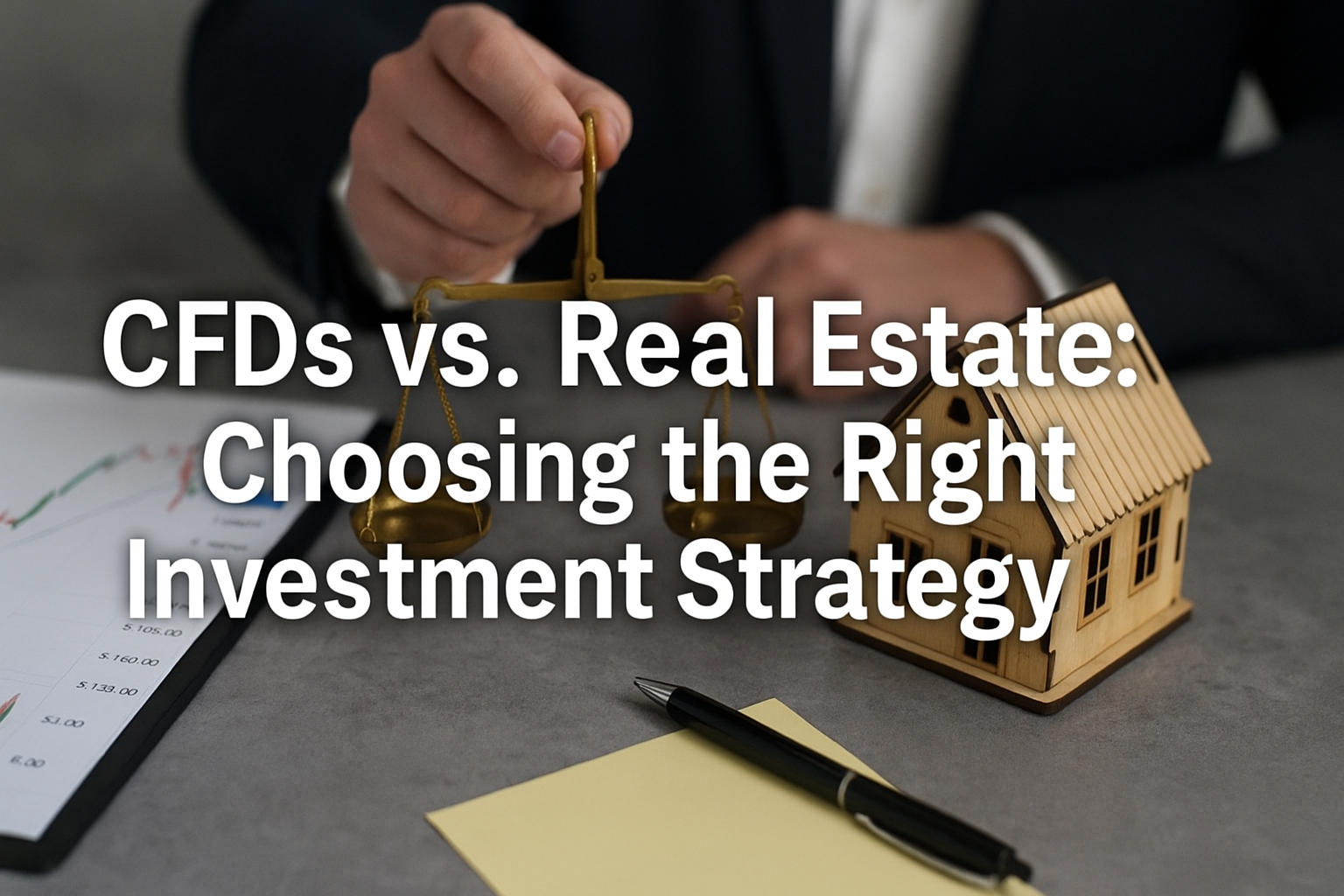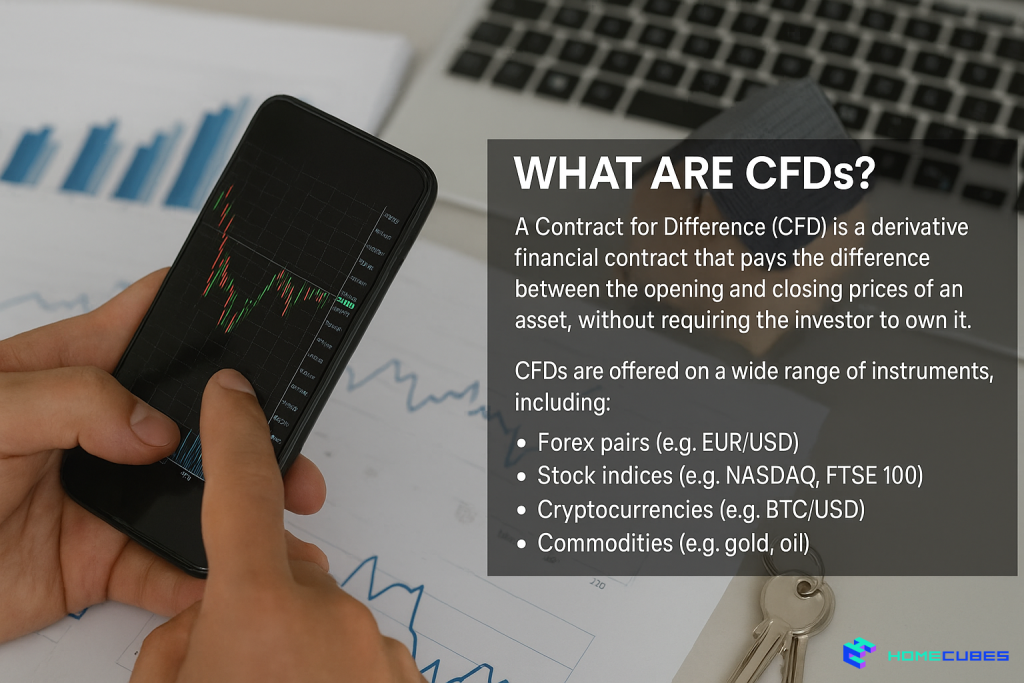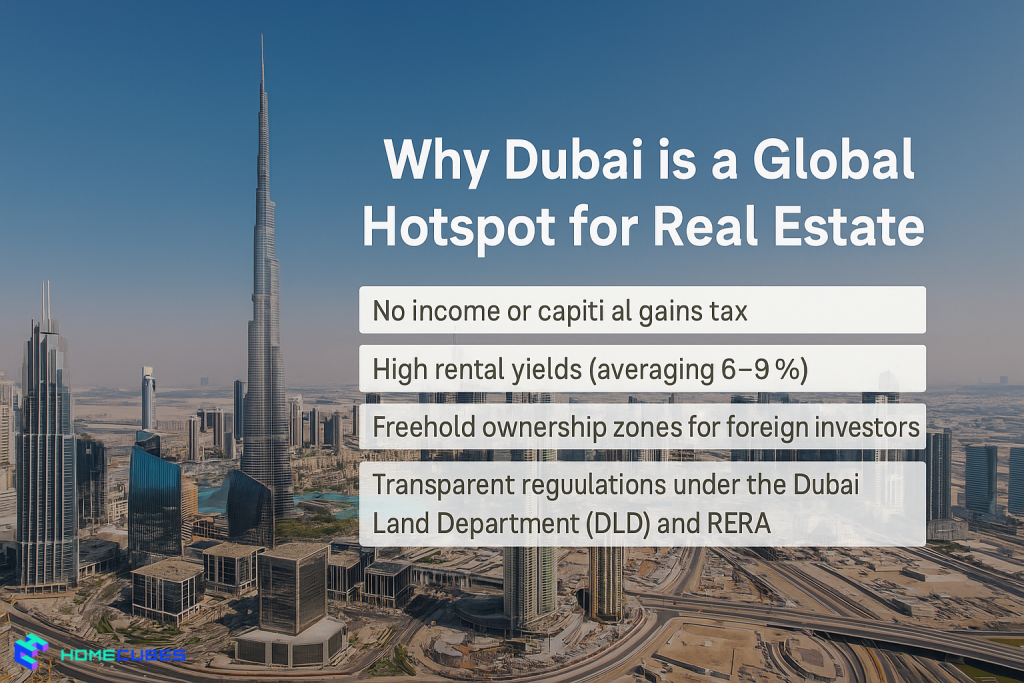

📘 Table of Contents
- Introduction
- What Are CFDs?
- CFD Strategy: How It Works
- What Is Real Estate Investment?
- Why Dubai is a Global Hotspot for Real Estate
- Side-by-Side Comparison
- Legal & Regulatory Considerations
- Real Estate ROI Breakdown: Dubai Example
- CFD Trading Example
- Case Studies
- When to Choose Each Strategy
- Can You Combine Both?
- Final Verdict: Which One Wins?
- Ready to Explore Fractional Real Estate in Dubai?
Introduction
Choosing the right investment strategy is one of the most important financial decisions you can make. Two widely discussed—but vastly different—paths are Contracts for Difference (CFDs) and real estate investment.
On one hand, CFDs offer leveraged exposure to a variety of asset classes, from global indices and forex to commodities and crypto. On the other hand, real estate offers tangible, long-term value through property ownership, rental income, and appreciation, however, if you are looking to speculate on the real estate market, you must know what to do, if your property won’t sell.
Stocks or Property?
Stocks generate much higher returns than property over time
HOWEVER …. Most retail investors tend to lose money in the stock market and make money in real estate because of the liquidity of stocks and the illiquidity of property.
In property, you cannot… pic.twitter.com/MC88XaFmpD
— Adam Khoo (@adamkhootrader) June 14, 2025
In this comprehensive guide, we compare CFDs vs. real estate investment across essential metrics—returns, risk, liquidity, capital requirements, time horizon, and more—so you can select a strategy that suits your financial goals.
What Are CFDs?

A Contract for Difference (CFD) is a derivative financial contract that pays the difference between the opening and closing prices of an asset, without requiring the investor to own it.
CFDs are offered on a wide range of instruments, including:
- Forex pairs (e.g., EUR/USD)
- Stock indices (e.g., NASDAQ, FTSE 100)
- Cryptocurrencies (e.g., BTC/USD)
- Commodities (e.g., gold, oil)
As explained on Moneysmart, CFD trading allows for high leverage to trade on an asset like share or index, but comes with equally high risks.
CFD Strategy: How It Works
CFD traders often use:
- Technical indicators like RSI, MACD, and Bollinger Bands.
- Fundamental news trading to capitalize on interest rate changes or earnings reports.
- Stop-loss and take-profit orders to manage position risk.
CFDs are best for short-term speculation, with trades lasting from minutes to days.
Pros of CFDs:
- High leverage potential (up to 1:30 or higher in some jurisdictions)
- Ability to go long or short
- Access to global markets 24/5
Cons:
- Can lose more than your initial deposit
- Requires deep technical/fundamental knowledge
- Subject to broker fees and overnight swap charges
What Is Real Estate Investment?
Real estate investment involves purchasing physical property with the goal of generating rental income or selling for profit after appreciation. Unlike CFDs, real estate is a tangible, asset-backed investment with much lower volatility.
Types of real estate investments:
- Residential (apartments, villas)
- Commercial (office buildings, malls)
- Industrial (warehouses, logistics hubs)
- Mixed-use developments
Real estate of any type, like choosing between penthouses or apartments in Dubai, can be purchased directly or via fractional ownership, REITs, or tokenized property platforms.
Why Dubai is a Global Hotspot for Real Estate

Dubai is known for:
- No income or capital gains tax
- High rental yields (averaging 6–9%)
- Freehold ownership zones for foreign investors
- Transparent regulations under the Dubai Land Department (DLD) and RERA.
According to Bayut, communities like Dubai Legend, Dubai Investment Park, and Dubai International City offer the highest ROI on studio units.
Pros of Real Estate:
- Long-term asset appreciation
- Passive income through rent
- Inflation hedge
- Mortgage leverage with property as collateral
- Significant tax deductions (interest, depreciation)
Cons:
- Requires capital commitment
- Illiquid (selling can take months)
- Subject to local regulation, maintenance, and market cycles
Side-by-Side Comparison
| Category | CFDs | Real Estate |
| Asset Type | Derivative, no ownership | Tangible, physical ownership |
| Risk Level | Very high (leverage) | Moderate to low (asset-backed) |
| Capital Requirement | Low (margin-based) | Medium to high |
| Liquidity | Very high (instant exit) | Low to medium |
| Income Potential | High but volatile | Steady rental income + appreciation |
| Holding Duration | Minutes to days | Years |
| Maintenance Needs | None | Repairs, property management |
| Tax Treatment | Minimal | Depreciation, mortgage interest, capital gains |
| Inflation Hedge | No | Yes |
| Asset Appreciation | None | Yes |
Legal & Regulatory Considerations
CFDs:
- In most regions (UAE, UK, EU), CFD brokers are regulated by financial authorities.
- In the U.S., CFDs are banned for retail traders due to their high-risk structure.
- UAE-based brokers must comply with SCA (Securities and Commodities Authority) guidelines.
Real Estate:
- Real estate in Dubai is governed by RERA, under the Dubai Land Department.
- Escrow accounts protect off-plan buyers.
- Investors can gain residency visas by investing a minimum amount in UAE property (currently AED 750,000+).
Real Estate ROI Breakdown: Dubai Example
Let’s say you buy a 1-bedroom apartment in JVC for AED 700,000:
- Rental income: AED 55,000/year
- Net ROI (after service fees, agency commissions): ~7.2%
- Capital appreciation potential: 3–6% annually depending on location
Compare that to CFDs, where your profit is fully dependent on accurate market timing, and you risk total loss due to leverage.
CFD Trading Example
You deposit $1,000 and trade EUR/USD with 30:1 leverage:
- Position size: $30,000
- A 1% favorable move earns $300
- A 1% adverse move wipes out 30% of your capital
This shows the amplified volatility and emotional stress involved in short-term CFD trading.
Case Studies
CFD Trader Profile – Alex
Alex is a 34-year-old trader with a background in finance. He trades U.S. indices and commodities using a CFD account. Despite early gains, he lost 40% of his capital during a period of high market volatility. He now trades with stricter risk management and limits leverage exposure.
Real Estate Investor Profile – Noura
Noura purchased two rental units in Dubai Marina. Her total capital was AED 2M (AED 1M mortgage). She earns AED 140,000 annually in gross rent and sees a 5.5% net yield. Capital appreciation since 2022: +12%. She enjoys predictable income and long-term security.
When to Choose Each Strategy
| Your Profile | Choose CFDs | Choose Real Estate |
| Want fast returns | ✅ | ✖️ |
| Prefer passive income | ✖️ | ✅ |
| Have low capital | ✅ | ✖️ (unless fractional/tokenized) |
| High risk tolerance | ✅ | ✖️ |
| Long-term planning & asset growth | ✖️ | ✅ |
| Time to monitor markets daily | ✅ | ✖️ |
Can You Combine Both?
Yes. Many investors:
- Use CFDs for active, short-term trading.
- Allocate profits into real estate for passive income and capital protection.
This strategy allows for high liquidity with low-risk reserves, ensuring diversification.
Final Verdict: Which One Wins?
There’s no universal winner between CFDs vs. real estate investment—only what’s right for you:
- CFDs offer agility, leverage, and risk, great for traders.
- Real estate provides stability, income, and long-term growth, ideal for asset builders.
The smartest strategy may involve both, using CFD profits to fund property portfolios or leveraging property as security to grow your overall capital.
Ready to Explore Fractional Real Estate in Dubai?
At Homecubes, we specialize in fractional real estate investment in Dubai—offering access to high-yield, tokenized property opportunities. We combine blockchain transparency with real-world asset security.
⚠️ Note: Homecubes is currently awaiting regulatory licensing from VARA (Virtual Assets Regulatory Authority) in Dubai. Our services will launch once approval is granted.
📩 Click here to contact us and be the first to receive investment alerts, market reports, and platform updates.










